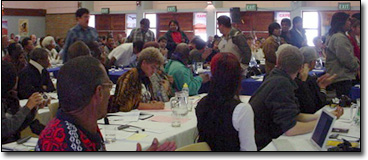|
KIMBERLEY INTRODUCTION
As the world prepared for the World Summit on
Sustainable Development (WSSD), Indigenous Peoples were called upon to
provide their own assessment of the implementation of sustainable
development over the last decade and to identify which priorities and
partnerships are important for them in the coming years. In 1992, at the
United Nations World Conference on Environment and Development (UNCED),
Indigenous peoples were recognized as a Major Group, and the United
Nations' objectives concerning their role is specified in Chapter 26, of
Agenda 21.
National Khoi-San Consultative Conference (NKOK) and the Indigenous Peoples' Coordinating Committee for the World Summit on Sustainable Development (IPCC-WSSD)
The Indigenous Peoples' Summit was organized
by an international Coordinating Committee, which was established and
consolidated during Preparatory Committees 2 - 4 of the WSSD. The
Coordinating Committee represented seven regions - Asia, Africa,
Circumpolar, Russia, Latin America, North America and the Pacific. It had
the responsibility for sharing information and communicating with their
regions, consolidating regional/thematic strategies, developing shared
priorities and strategies for the WSSD and beyond, preparing for the
Indigenous Peoples' Summit and coordinating an agenda of Indigenous
side-events during the WSSD.
The National Khoisan Consultative Conference, South Africa was responsible for the logistical arrangements for the summit. In 1992 prior to the UNCED, Indigenous peoples held their own summit in Kari-Oca to develop their own Declaration and Charter on sustainable development. The Kari-Oca Summit was instrumental in formulating the basic documents for Indigenous Peoples on issues related to sustainable development at a global level, and for influencing the official and the civil society summits. Ten years after, Indigenous Peoples gathered once again, this time they assessed the progress that had been attained as well as identifying future priorities and partnerships for achieving sustainable development. |
International Relations | Kari-Oca to Kimberley | Kari-Oca Declaration | Earth Charter I Earth Charter - Interactive Version I Kari-Oca at UNCED I Kari-Oca Revisited
Relaciones Internacionales | De Kari-Oca a Kimberley | La Declaración de Kari-Oca I La Carta de la Tierra I La Carta de la Tierra - Version Interactiva I Kari-Oca en UNCED
